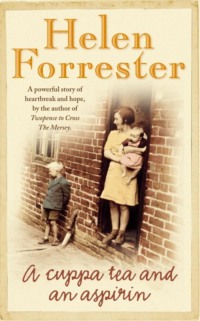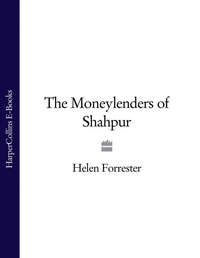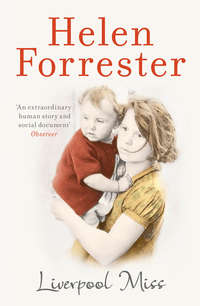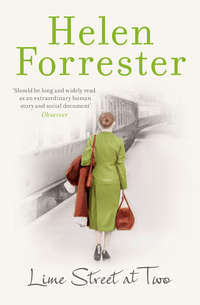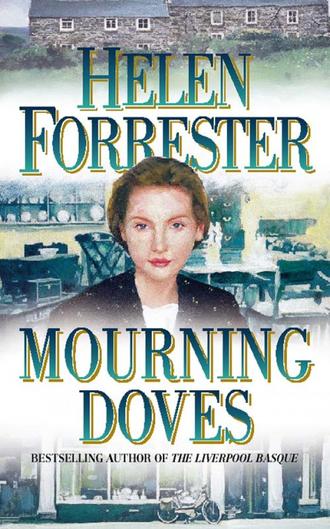
Полная версия
Mourning Doves
If I were her, Dorothy thought, I wouldn’t be sitting here drinking coffee; I’d be on my way home, I would. It was not her business, however, so she withdrew discreetly, to descend again to the kitchen and share her thoughts with Winnie.
Chapter Nine
As Ethel clumped through the hall on her way to the kitchen to get a bucket of clean hot water with which to wash the tiles of the front hall, she heard a high shriek from the breakfast room, followed by the sound of someone bursting into tears. She paused uncertainly, wondering if the Missus and Miss Celia were having a row. Then she remembered that Mrs Woodcock had come on a visit while she had been wiping down the front railings and she wondered if the lady had, perhaps, fallen over the Old Fella’s footstool – and her expecting.
She put down her bucket, wiped her hands on her sackcloth apron and ran across to the breakfast-room door. Clearly through it, she heard Miss Celia’s agitated voice say, ‘You mean it’s coming?’
Mrs Woodcock replied tearfully, ‘Yes, dear. The water’s broken. Could you ask Mrs Gilmore to come – quickly? Please!’
In response to this urgent request, the bell in the kitchen jangled distantly. Ethel tentatively opened the door, to peep round it.
Mrs Woodcock was writhing and whimpering in the Mistress’s chair. She was gasping, ‘I’m so sorry, Celia. I’m so sorry.’
In order to remove her visitor’s wide-brimmed hat, Miss Celia was trying to take out Mrs Woodcock’s hatpins, which were pulling at the poor lady’s hair as she turned and twisted.
Thumb in mouth, Eric was staring at his mother. Then he let out a frightened yell and ran to her, to clutch at her skirt and try to climb on to her knee.
Dorothy came running through the green baize door at the back of the hall. She inquired of Ethel in a low voice, ‘What’s up?’ She crowded close to the little kitchen maid, her nose twitching nervously as she peered at the breakfast-room door.
Ethel stepped back from the door and turned to her eagerly. ‘I think Mrs Woodcock’s baby’s coming,’ she replied in an excited whisper. ‘Shall I run up and tell the Mistress?’
Dorothy paused for a moment, her hand on the brass doorknob.
‘Holy Mary! Are you sure?’
‘Sounds like it.’ Ethel pointed a thumb at the half-open door. They could both hear Phyllis’s frightened little gasps and Miss Celia’s ineffectual reassurances.
‘Oh, aye. Go and tell the Mistress – quick.’ Dorothy pushed the girl aside and, feeling a little scared, entered the room. She nearly tripped over a cat which shot out and across the hall.
Celia was bent over her friend. She looked up and exclaimed through white lips, ‘Oh, Dorothy! Thank goodness you’re here. Ask the Mistress to come down. Mrs Woodcock is in great distress.’
Eric, pushed away by his mother, was sitting on the hearth rug. At the sight of another strange woman, he began to shriek in good earnest.
Over his noisy protest, Dorothy replied calmly, ‘Ethel’s gone for her, Miss. Here, let me take the little boy.’ She bent down and swept the child up into her arms. ‘’Ere, now. You just be quiet – and your mam’ll be fine.’ She spun round and picked up a Marie biscuit from the coffee tray, then walked him over to the window. She pointed out a couple of pigeons roosting on the back wall and gave him the biscuit to eat. In thirty seconds, she had reduced his howls to small sobs.
She wiped away his tears with her apron and told him he was a good, brave little boy, and, in a minute or two, his Auntie Dorothy would take him down to see the tom cat in the kitchen.
Over her struggling friend’s head, Celia looked at Dorothy with amazement; she had never seen her before as anything but an automaton who cleaned rooms and waited at table, and said dully and mechanically, ‘Yes, Miss,’ or ‘No, Miss,’ in response to whatever was said to her.
Wrapped in a camelhair dressing gown, knitted slippers on her feet, Louise came running into the room, twisting her wet hair into a knot as she came. ‘That fool of a girl said …’ Then, as she saw the little tableau by the fireplace, she realised that the message Ethel had blurted out was true.
She had been feeling helpless and deserted as she lay crying in the cooling water of her bath. But when Ethel had knocked frantically at the bathroom door and poured out her message, she had instinctively responded to the call for help.
Now, faced with Phyllis’s obvious desperate need and the necessity of saving her fine old Turkish hearth rug from being ruined by having a baby born on it, she entirely forgot her grief.
She said calmly to Celia, ‘Find Ethel and send her for Dr Hollis.’
Celia fled.
Phyllis lifted a woebegone face, flushed with shame, to Louise. ‘I’m so sorry – oh – I’ve ruined your chair – the water’s broken.’ She gave another little moan. ‘I’m having a midwife, Mrs Fox from Green Lane – if I could get home, I could send for her.’
There was a tartness in Louise’s voice, as she responded, ‘I don’t have a carriage to send you home in, my dear. Timothy would never have a carriage – said they were more nuisance than help.’ As she spoke, she was pulling back the stool on which Celia had been seated, to clear a path to the door, so that they could move Phyllis upstairs.
‘To order a cab would take precious time,’ she went on. ‘I don’t think we should chance it. But don’t worry.’
The tearing, familiar ache which enclasped Phyllis’s waist eased for the moment and she protested quite coherently, ‘The pains don’t seem to be coming very fast yet. Surely I could reach home all right, couldn’t I?’
For reasons which Louise could not analyse herself, she was reluctant to let Phyllis go.
The sudden crisis had jolted her out of her own grief, diverted her mind. She was loath to face again a long day which, she knew, would otherwise become filled with problems which she did not know how to deal with. Childbirth was familiar – at least she knew from experience how to deal with that, she told herself.
With a sense of power and new-found energy, she said gently, ‘Don’t chance it, Phyllis. The baby might be damaged, if you gave birth in a cab. We’ll try to get you upstairs and on to a bed.’
With all her normal authority, she turned to Dorothy, who was jigging round and round to make the child in her arms laugh and was having some success with him. ‘Take the little boy down to the kitchen – Eric, is it? And ask Winnie to come up, please.’
Making a great game of Eric riding a horse, Dorothy galloped out of the room. Before Louise turned back to her stricken guest, she actually smiled briefly at such an amusing display from her parlourmaid.
Celia had already found Ethel in the kitchen, placidly emptying more hot water from the kettle into her bucket. She hastily instructed the young girl to take off her apron and run – run – for Dr Hollis. Then, a little breathlessly, she explained to a startled Winnie what was happening.
‘Well, I never!’ Winnie exclaimed with interest. She wiped her hands on the towel tucked into her waistband, and then stood with arms akimbo, as she considered the situation. ‘Do you think it’ll be born here?’
‘I don’t know, Winnie – I don’t know much about these things. Mrs Woodcock seems in great pain.’
‘Well, of course, you don’t know, Miss Celia. You being a single lady, like. I’ll put the kettle on in case.’ She seized her largest kettle and went to the sink to fill it.
‘Mrs Woodcock is all wet, Winnie – and the hearth rug and the chair are soaked.’
‘Oh, dear.’ The cook looked knowingly at her young mistress, as she hung the kettle on a hook over the roaring fire. She was about to say something more, when Dorothy clattered down the stairs, with a giggling Eric bumping on her shoulder.
‘Missus wants you – now. There’s a right to-do up there.’ She jerked her head towards the staircase. ‘And this young man wants to see Tommy Atkins, don’t you, pet?’
Tommy Atkins, long, thin and black, was curled up on Winnie’s rocking chair. At the sound of his name, he pricked up one ear and half opened a green eye, perhaps suspicious that he was about to be dumped in the cellars to deal with a mouse.
Winnie was already taking off her blue and white striped kitchen apron, to reveal a spotlessly white one underneath. She looked a little grim, as she said, ‘Oh, aye. Miss Celia just told me.’
Feeling that Eric was better left with Dorothy, who had obviously captivated him, she said to Celia, ‘If you don’t mind, Miss, you’d better come up as well. If we got to move Mrs Woodcock, like …’ She stumped up the stairs and Celia followed her, her thin white hands folded tightly against her stomach, as she tried to quell the panic within her. She dreaded to think what might be happening to Phyllis – and yet the situation held a morbid fascination for her. Could a baby really arrive like Phyllis had told her they did?
When they hurried into the breakfast room, Phyllis was still sitting in the ruined chair. To Celia’s relief, she did not appear to be in pain.
Louise was patting the pregnant woman’s shoulder comfortingly, as she said briskly to Winnie, ‘Celia will have told you of Mrs Woodcock’s condition. Do you have an old oilcloth tablecloth downstairs?’
To Celia’s surprise, Winnie did not seem particularly mystified by the question. ‘Er … Yes, Ma’am. There’s one on the table I keep the bread bin on. I could wipe it down for you.’
‘Good. Open up the spare room bed and lay it on the mattress. Then get some of the old sheets from the sewing room and put them over it – in a pad, if you understand what I mean. Tuck them in well.’
Winnie smiled widely, showing a gap where a front tooth was missing. ‘Yes, Ma’am. We’ll have Mrs Woodcock comfortable in no time.’
‘There’s one basin on the washstand – better get a couple of tin ones from the kitchen as well. And tell Ethel or Dorothy to make a fire in the bedroom – it’ll be too cold for a newborn baby.’
Showing a surprising turn of speed, Winnie went to do as she was told, while Phyllis wailed, ‘I’m putting you to so much trouble!’
‘No, no, my dear. You can’t help it.’ Louise sounded calmer than she had at any time since her husband’s demise, and Celia realised with astonishment that all the women were thrilled with what was happening, including the usually lethargic Ethel, who had not even stopped to take off her sackcloth apron before sprinting off to get the doctor.
With infuriating leisureliness, the doctor’s wife received Ethel’s breathless message, panted out in her dark hallway.
‘Doctor’s still doing his morning surgery,’ she told the little maid, and, as if to confirm her words, an elderly lady accompanied by a young girl came out of a back room, followed by the cheerful voice of Dr Hollis. ‘Now, remember, three times a day – and plenty of rest.’
The old lady smiled faintly, but did not respond, and Ethel and Mrs Hollis made space for her to get to the front door. ‘Goodbye, Mrs Formby,’ Mrs Hollis said courteously to the patient, as she closed the front door after her.
She turned back to a fidgeting Ethel. ‘Do you know how fast Mrs Woodcock’s pains are coming?’ she inquired, and before Ethel could reply, she continued, ‘I don’t think Mrs Woodcock is one of our patients, is she?’
Ethel was sharp enough to realise the inference of the last remark. It meant, who will pay the doctor’s fee? She liked Mrs Woodcock, who was always polite to her, so she answered stoutly, ‘I don’t know about the pains, Ma’am. But she’s a real friend of Miss Celia, and it were Mrs Gilmore herself what sent me here.’
‘I see.’ The reply appeared acceptable, because Mrs Hollis said she would ask the doctor to step round immediately surgery was over. In about an hour, he should be there.
‘Thank you, Ma’am.’
Full of excitement, her need to find another job completely forgotten, Ethel opened the doctor’s front door and sped down the steps.
Chapter Ten
Immediately upon her return, Ethel was entrusted with the job of taking Eric home. At first, Eric objected strongly to being taken from Dorothy and the comfortable security of the Gilmore basement kitchen. He remembered that his mother was upstairs and he shrieked that he wanted her. Fortunately, from the distant confines of the spare bedroom Phyllis could not hear him. If she thought about him at all, it was with the confident expectation that he would be properly cared for in her friend’s house, and would soon be delivered safely back to Lily.
Ethel carried with her a note from Louise to Lily, Phyllis’s cook-general, explaining what was happening, and asking her to feed the children their lunch and tea, and to make sure that Mr Woodcock’s dinner was ready for him when he came home from work. It was possible, Louise advised her, that Mrs Woodcock would not be home for a couple of days. She added that she would arrange for Mr Woodcock to be informed, at his office, of his wife’s predicament.
While Louise hastily scribbled a note to Arthur Woodcock, Phyllis sat on the edge of the wooden chair in the spare bedroom. Winnie helped to divest her of her sodden clothes and then slipped one of Celia’s huge cotton nightgowns over the young mother’s head.
‘Arthur’s going to be awfully cross,’ Phyllis whimpered to Celia. She gave a small shivering sigh, and then winced as a roll of pain commenced.
Startled, Celia looked up at her. ‘Why?’ she asked. ‘It’s his baby, too!’ She had been inspecting the soft pad of old sheets Winnie had contrived in the middle of the bed, and now she shook out and spread over it another clean sheet and a light blanket to keep her friend warm. She was surprised at Phyllis’s remark; it contradicted all that she had learned from the many romances she had read. Didn’t men love their wives for producing their children?
Phyllis gritted her teeth and waited for a spasm to pass before she said hopelessly, ‘Oh, he’ll be cross about everything. For my being such an idiot as to get caught like this – and having to help Lily care for the other little ones. He always gets angry if his routine is upset, and Lily will have her work cut out with three children and the house to look after.’
Winnie interrupted the exchange, to get Phyllis into bed before the pain increased. She smiled benignly down. ‘Don’t you worry about your hubby, Ma’am. You just concentrate on the baby, and relax as much as you can between your pains. You’d be surprised how men can manage, if they have to.’
But Phyllis knew her husband too well to hope for anything other than constant complaints and weak bursts of sudden rage, and she closed her eyes to try to stop the tears rolling down her cheeks.
Celia gently folded the bedclothes over her friend, and bent to kiss her. When she saw that Phyllis was crying, she took her handkerchief out of her sleeve and wiped the tears away. Then she hesitantly kissed her again. Though she was quite frightened at being so close to a birthing mother, she said cheerfully, ‘Winnie’s right. Mother will talk to Arthur, I’m sure. She’s just gone downstairs to write a note to him – Ethel will take it to his office – and she can write today to your mother, if you’ll give her the address, to ask her to come like she did for the other children. If we post a letter soon, she’ll get it by tomorrow afternoon’s post.’
Phyllis conjured up a small smile. Her mother would certainly come and would run the family like a general conducting a battle – and Arthur would hate her more than ever. And take it out on Phyllis the day her mother left.
Winnie had gone to look at the old clock on the mantelpiece to check the timing of the recurrence of Phyllis’s pangs of pain. As Louise bustled back into the room after dispatching Ethel, Winnie said to her, ‘The baby will be a while yet, Ma’am. Shall I make some tea? Miss Celia could sit with Mrs Woodcock while I do it; and you could get dressed before the doctor comes.’
Louise had forgotten her own bedraggled state. She glanced down at her dressing gown, and laughed. ‘Yes, indeed, I must, mustn’t I?’ She hastened off to her own bedroom, saying to Phyllis as she went that she would send Ethel to Arthur’s office as soon as she returned from delivering Eric to Lily.
The laugh surprised and pleased Celia. Though childbirth was not a normal thing to her, it obviously was to her mother; and a sense of normality was what they all needed. As Winnie pushed the bedroom chair towards her, so that she could sit by the patient, she took Phyllis’s hand and squeezed it.
‘Is there anything I need to do for Mrs Woodcock?’ she asked Winnie, hoping that she herself would not faint if the baby came while the other two women were out of the room.
‘If the pains are sharp, you just hold Mrs Woodcock to comfort her until they pass. If they start to come close together, pull the bell immediately and I’ll run up. But she’ll know, won’t you, Ma’am?’
Phyllis nodded. She knew only too well from experience, and, in her despair, she wondered how she could endure being racked by childbirth almost every year of her life.
As it happened, Celia was not left alone with Phyllis, because Dorothy came up with buckets of coal and wood chips and yesterday’s newspaper tucked under her arm, to make a fire to warm the room for the arrival of the new infant. She had reluctantly relinquished Eric to a buoyant Ethel, who was undeterred by Eric’s howls and flying little fists. She picked him up and held him firmly against her shoulder, as she ran down the front steps.
As Dorothy expertly built the fire, she realised that she was enjoying the unusual morning. ‘Young Eric went off quite happy with Ethel, Ma’am,’ she told Phyllis. She paused while she screwed up the newspaper and laid loose balls of it in the fire grate. ‘She comes from a family of thirteen, so she’s fine with children. Lovely little fella, he is,’ she added.
Phyllis nodded, and then gave a long, slow moan. God help me if I have to go through this thirteen times, she thought.
Celia leaned over and put an arm round her. Phyllis’s face was contorted; then, to Celia’s relief, she relaxed, and said in her usual soft tones, ‘Thank you, Dorothy, for managing him so well.’
‘It were nothin’, Ma’am.’ Dorothy was acquainted with Mrs Woodcock’s Lily and knew all about Arthur Woodcock’s relations with his wife. Both maids had lost sweethearts in France and had little hope of marrying. They were agreed, however, that it was better to be single than have a nit-picking husband like him. She picked up a pair of bellows lying in the hearth and blew the struggling fire until the coals had caught thoroughly.
As she tidied up the hearth, and with a polite bob towards the bed, went slowly down the stairs to the kitchen, her mood changed. If her Andy had survived the second battle of the Marne and come home last year, she could have been hoping for a baby now, even though she was middle-aged. Andy would have made a great dad, like the old man who was his dad, she thought wistfully. Pity they’d waited so long, though seven years’ engagement wasn’t that long. After all, you were supposed to save before you could marry. Not that she had saved when she had been working in the ordnance factory. Easy come, easy go.
As she washed the coal dust off her hands in the pannikin in the kitchen sink, she smiled and shrugged her shoulders at the memory of the good times she and Andy had had when he had come home on leave.
Forget it, she told herself. You could have been stranded now, with a young baby to bring up alone. It was going to be hard enough to find a new, decent place without a child. With one, she wouldn’t have a hope.
A bell on its spring near the kitchen ceiling rang suddenly.
She grinned wryly to herself as she dried her hands on the kitchen roller towel. Miss Celia getting into a panic, no doubt.
Winnie was busy pouring hot water into a big breakfast teapot. As she laid the pot on the tray she had prepared, she chuckled. A similar thought had occurred to her. As Dorothy quickly took off her enshrouding sacking apron which she used for rough work, the cook said, ‘It won’t hurt Miss Celia to see a birth – it’s probably the only chance she’ll get! And any woman ought to know what to do. Here, take the tray up to them.’
Dorothy’s small mouth quirked into a smile of agreement. ‘Oh, aye, if she does, she’s going to be proper shocked. She don’t know nothin’ about nothin’. I’d bet on it.’
Years later, after another war, looking back on that day, Celia had smiled. She had been terrified. But in a few hours, she had learned so much about women, she considered; that they could organise in a crisis, work through it together, be brave under suffering. And, further, that you did not know what friendship meant until you had faced crises together.
It changed for ever her ideas of what women could do, without men to tell them what incompetent fools they were. They had, of course, sent for the doctor – male – but, unlike her father, he had actually approved of their efforts on Phyllis’s behalf.
Chapter Eleven
Because she had no idea at what point in the proceedings the baby would arrive, Celia had rung the bell when a much sharper pang had struck Phyllis; instead of a moan, she had suddenly cried out.
By the time Dorothy had navigated two flights of stairs with the tea tray, Phyllis was more relaxed and was whispering an apology to Celia for being such a coward.
Dorothy put down the tray on the dressing table, and inquired if Madam would like a cup of tea.
Facing for the moment only an awful ache round her waist, Madam said with a sigh that she would, so Celia propped her up a little with an extra pillow and held the cup while she sipped. Dorothy filled another cup and set it down on the bedside table near Celia.
Since Phyllis did not seem threatened by another immediate spasm and Celia’s face was an unearthly white, the maid tried to reassure Celia by saying, ‘Don’t fret, Miss. You drink your tea, too. It’ll be a bit yet afore the baby comes. The pains come quick when baby is actually on its way. Winnie’s got the kettle on for when the doctor comes, and she’s going to make a bit of lunch for everyone.’
The reminder that the doctor would be coming was a comfort, and Celia felt a little better. In fact, Louise had only just finished her toilet, when he arrived.
While Celia and her mother retired to a corner of the room, he did a quick examination of his patient, then pulled down her nightgown and neatly replaced the sheet and blanket over her. He assured the struggling mother that the baby appeared to be positioned correctly and that he did not expect the delivery to be difficult.
Phyllis told him that she had arranged for Mrs Fox, the midwife, to help with the delivery, but that she had been caught unexpectedly in dear Mrs Gilmore’s house, and that Mrs Gilmore had sent for him.
‘Excellent. Excellent woman, Mrs Fox,’ he said, as he picked up his hat. ‘She has a telephone by which she can be reached – the chemist next door to her is very obliging in this respect. I’ll phone her as soon as I get back to the surgery.’ He patted Phyllis’s hand, and when Louise came forward, he told her, ‘I doubt if Mrs Woodcock will need my services, but I expect you have someone you could send for me, if Mrs Fox feels it necessary?’
All the women were reassured by the doctor’s visit, and, when warm, friendly Mrs Fox rolled quietly into the bedroom, her tiny slippered feet making no sound on the carpet, despite her vast bulk, Phyllis greeted her with pleasure before suddenly arching her back and emitting a sharp scream.
Shocked, Celia spilled some of Phyllis’s second cup of tea as she hastily put the cup down on the bedside table. She looked imploringly at Mrs Fox as she straightened herself up. Phyllis’s eyes were closed, and she was taking small, quivering breaths.
‘Don’t leave me, Seelee,’ Phyllis breathed and sought for Celia’s hand, which she clutched tightly. Only Celia understood how fretful and awkward Arthur was. She would understand how Phyllis was dreading going home to face his constant nagging, when she would be at her weakest after the ordeal of childbirth; the presence of Celia in his home had never deterred Arthur from humiliating his wife by picking at her whenever he was annoyed. Even if Celia did not understand the root causes of it, her friend had seen enough to understand her terrible underlying unhappiness.



